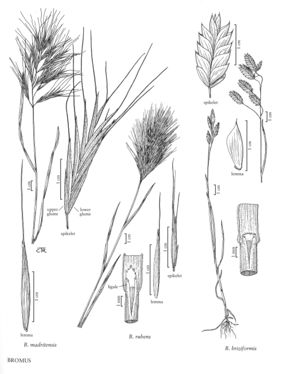Difference between revisions of "Bromus rubens"
FNA>Volume Importer |
imported>Volume Importer |
||
| (4 intermediate revisions by 2 users not shown) | |||
| Line 4: | Line 4: | ||
|publications= | |publications= | ||
|common_names=Foxtail chess;Red brome | |common_names=Foxtail chess;Red brome | ||
| + | |special_status={{Treatment/ID/Special_status | ||
| + | |code=I | ||
| + | |label=Introduced | ||
| + | }} | ||
|basionyms= | |basionyms= | ||
|synonyms={{Treatment/ID/Synonym | |synonyms={{Treatment/ID/Synonym | ||
|name=Bromus madritensis subsp. rubens | |name=Bromus madritensis subsp. rubens | ||
| − | |authority= | + | |authority= |
| + | |rank=subspecies | ||
}} | }} | ||
|hierarchy=Poaceae;Poaceae subfam. Pooideae;Poaceae tribe Bromeae;Bromus;Bromus sect. Genea;Bromus rubens | |hierarchy=Poaceae;Poaceae subfam. Pooideae;Poaceae tribe Bromeae;Bromus;Bromus sect. Genea;Bromus rubens | ||
| Line 20: | Line 25: | ||
-->{{Treatment/Body | -->{{Treatment/Body | ||
|distribution=Md.;Mass.;N.Mex.;Tex.;Utah;Calif.;S.C.;Va.;Idaho;Mont.;Oreg.;N.Y.;Pacific Islands (Hawaii);Wash.;Ariz.;Nev. | |distribution=Md.;Mass.;N.Mex.;Tex.;Utah;Calif.;S.C.;Va.;Idaho;Mont.;Oreg.;N.Y.;Pacific Islands (Hawaii);Wash.;Ariz.;Nev. | ||
| − | |discussion=<p>Bromus rubens is native to southern and southwestern Europe. It now grows in North America in disturbed ground, waste places, fields, and rocky slopes, from southern Washington to southern California, eastward to Idaho, New Mexico, and western Texas. It was found in Massachusetts before 1900 in wool waste used on a crop field; it is not established there. The record from New York represents a rare introduction; it is not known whether it is established.</p> | + | |discussion=<p><i>Bromus rubens</i> is native to southern and southwestern Europe. It now grows in North America in disturbed ground, waste places, fields, and rocky slopes, from southern Washington to southern California, eastward to Idaho, New Mexico, and western Texas. It was found in Massachusetts before 1900 in wool waste used on a crop field; it is not established there. The record from New York represents a rare introduction; it is not known whether it is established.</p> |
|tables= | |tables= | ||
|references= | |references= | ||
| Line 29: | Line 34: | ||
-->{{#Taxon: | -->{{#Taxon: | ||
name=Bromus rubens | name=Bromus rubens | ||
| − | |||
|authority=L. | |authority=L. | ||
|rank=species | |rank=species | ||
| Line 37: | Line 41: | ||
|family=Poaceae | |family=Poaceae | ||
|illustrator=Cindy Roché | |illustrator=Cindy Roché | ||
| + | |illustration copyright=Utah State University | ||
|distribution=Md.;Mass.;N.Mex.;Tex.;Utah;Calif.;S.C.;Va.;Idaho;Mont.;Oreg.;N.Y.;Pacific Islands (Hawaii);Wash.;Ariz.;Nev. | |distribution=Md.;Mass.;N.Mex.;Tex.;Utah;Calif.;S.C.;Va.;Idaho;Mont.;Oreg.;N.Y.;Pacific Islands (Hawaii);Wash.;Ariz.;Nev. | ||
|reference=None | |reference=None | ||
|publication title= | |publication title= | ||
|publication year= | |publication year= | ||
| − | |special status= | + | |special status=Introduced |
| − | |source xml=https:// | + | |source xml=https://bitbucket.org/aafc-mbb/fna-data-curation/src/200273ad09963decb8fc72550212de541d86569d/coarse_grained_fna_xml/V24/V24_320.xml |
|subfamily=Poaceae subfam. Pooideae | |subfamily=Poaceae subfam. Pooideae | ||
|tribe=Poaceae tribe Bromeae | |tribe=Poaceae tribe Bromeae | ||
Latest revision as of 17:23, 11 May 2021
Plants annual. Culms 10-40 cm, erect or ascending, often puberulent below the panicle. Sheaths softly pubescent to pilose; auricles absent; ligules 1-3(4) mm, pubescent, obtuse, lacerate; blades to 15 cm long, 1-5 mm wide, flat, pubescent on both surfaces. Panicles 2-10 cm long, 2-5 cm wide, erect, dense, often reddish brown; branches 0.1-1 cm, ascending, never drooping, not readily visible, with 1 or 2 spikelets. Spikelets 18-25 mm, much longer than the panicle branches, densely crowded, subsessile, with parallel sides or widening distally, moderately laterally compressed, with 4-8 florets. Glumes pilose, margins hyaline; lower glumes 5-8 mm, 1(3)-veined; upper glumes 8-12 mm, 3-5-veined; lemmas 10-15 mm, linear-lanceolate, pubescent to pilose, 7-veined. rounded over the midvein, margins hyaline, apices acuminate, teeth 1-3 mm; awns 8-20 mm, straight, reddish, arising 1.5 mm or more below the lemma apices; anthers 0.5-1 mm. 2n = 14, 28.
Distribution
Md., Mass., N.Mex., Tex., Utah, Calif., S.C., Va., Idaho, Mont., Oreg., N.Y., Pacific Islands (Hawaii), Wash., Ariz., Nev.
Discussion
Bromus rubens is native to southern and southwestern Europe. It now grows in North America in disturbed ground, waste places, fields, and rocky slopes, from southern Washington to southern California, eastward to Idaho, New Mexico, and western Texas. It was found in Massachusetts before 1900 in wool waste used on a crop field; it is not established there. The record from New York represents a rare introduction; it is not known whether it is established.
Selected References
None.
